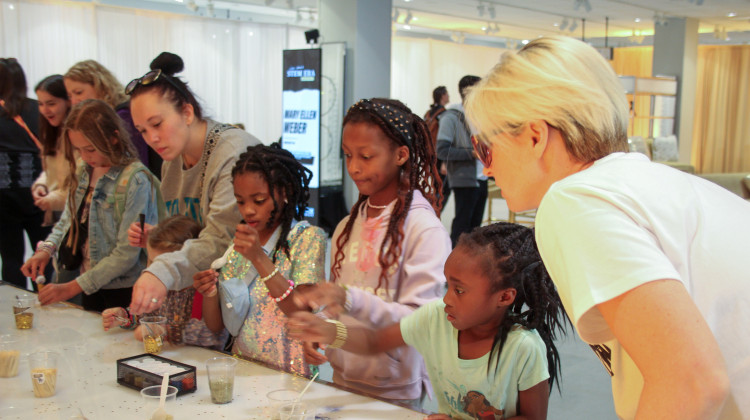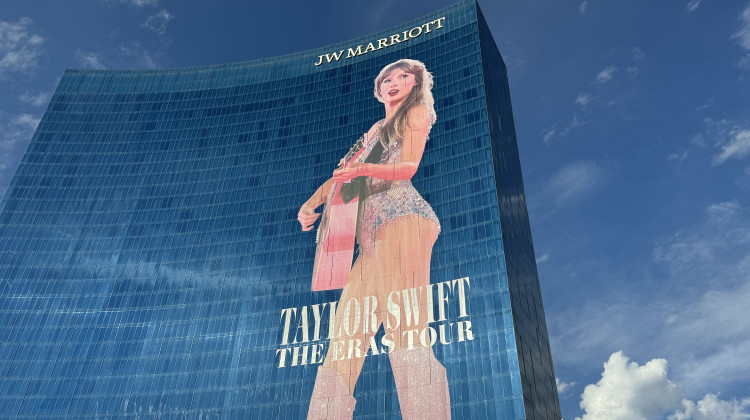Daniel Coles stands outside Rock Bottom Brewery. He lifts a guitar from a case, places a harmonica in front of his mouth, and straps a tambourine to his ankle. Now a one-man band, he’s set to entertain an audience of whoever shows up.
"A lot of times I just come down and play," he says. "I don’t put a hat out or anything. I just play for the fun of it. I love playing outside. I love to take requests. I dream of being one of those metal people, but I’m like a human jukebox where you come and put your dollar in, and you just say your song, and I play twenty seconds of it."
Coles has been busking downtown for about fourteen years –less consistently these days, now that he’s married with kids. Tonight, though, he and a few other performers are getting a hand from the “Downtown Busking Campaign”—an effort to encourage street performance—receiving a small stipend while a bucket sporting the campaign’s name sits at his feet, gathering any tips a passerby might provide.
Indianapolis isn’t known for its street performers, or buskers. Not like New York, where subway musicians must book their spots months in advance; or Chicago, where you can’t walk a block down Michigan Avenue without spotting a magician or mime. But a new downtown campaign—sponsored by Indy Fringe, the Indy Arts Council and Indianapolis Downtown, Inc., taking place each Friday and Saturday evening through Aug. 23 wants to change that perception.
Coles launches into a version of Dylan’s “Buckets of Rain”, and IndyFringe’s Pauline Moffat stands close by. Tonight she’s acting as a sort of booking agent and promoter for the campaign, popping into businesses to make sure each performer’s presence is welcome. Moffat says street performance gives cities a dynamic dimension.
"Vibrant cities have vibrant street art," she says. "And we want to bring this to Indianapolis."
She says more street performers downtown would be great for the city, but thinks people downtown aren’t used to it. So one of the campaign’s goals is normalizing street performance, helping people differentiate between busking and what some might consider panhandling.
"It’s as much an education program for the public as it is the performers on the streets," Moffat says. "It’s spontaneous, and it’s fun."
On Georgia Street a rapper named Carlos performs an improvised IU basketball fight song.
At a table about twenty feet away Kim Lock watches while sipping a glass of wine. She says different kinds of performers dotting the city’s sidewalks gives a night out downtown character.
"You see things that you’re not going to see inside of a mall," she says. "You know, visitors, out-of-towners, if my kids were young, it’s something they’re going to see and learn, whether it’s juggling, singing, acting…it’s cool."
Just south of Monument Circle a man in 18th century pre-revolutionary clothing performs a magic trick, captivating a group of teenagers.
He’s Taylor Martin, or Rodney the Younger, as he’s known tonight. He places a single sponge ball into a girl’s hand and asks her to close her fist—then reopen it, revealing two sponge balls and prompting a chorus of “ahhhs”.
A magician by trade, Martin performs regularly at local theaters. He says wowing audiences is what keeps food on his table. But he also says performing gives him something else just as important as tips in a hat.
"You know, what I get out of it, is watching their mouths drop," he says. "Just on days when I’m feeling really, really rotten, I can go out and do a magic trick in a bar or on the street somewhere and someone says, 'Oh, do that again', well, you know, I’m the number one person in their life at that moment."
As the teens disperse, Martin seeks out a new audience. Looking for a place to draw a bigger crowd, he climbs the steps surrounding the downtown monument and beckons to the crowd below.
“Would you like to see another magic trick?" he asks.
As a crowd gathers around, there again is Moffat, marveling at Martin’s ability to draw a crowd.
"Being able to gather a group around you and engage them for ten minutes is not easy," she says. "And there isn’t a great volume of people walking to and fro. So that takes a bit of patience and a bit of skill, really."
It's a skill she hopes the campaign instills in performers so it might translate into more support for busking.
Back outside Rock Bottom, Daniel Coles echoes the thought, saying he hopes the public buys into the idea. Because, he says, something magical, almost primal, happens when the street, the artist and the audience converge.
There’s nothing like once you get in the groove on the street," he explains. "And people are stopping and dancing and singing. Maybe it’s only comparable to primitive musical rituals or something. That’s the only thing I can really compare it to."
And if the busking campaign succeeds, more of these “rituals” could be coming to a sidewalk near you.
 DONATE
DONATE







 Support WFYI. We can't do it without you.
Support WFYI. We can't do it without you.